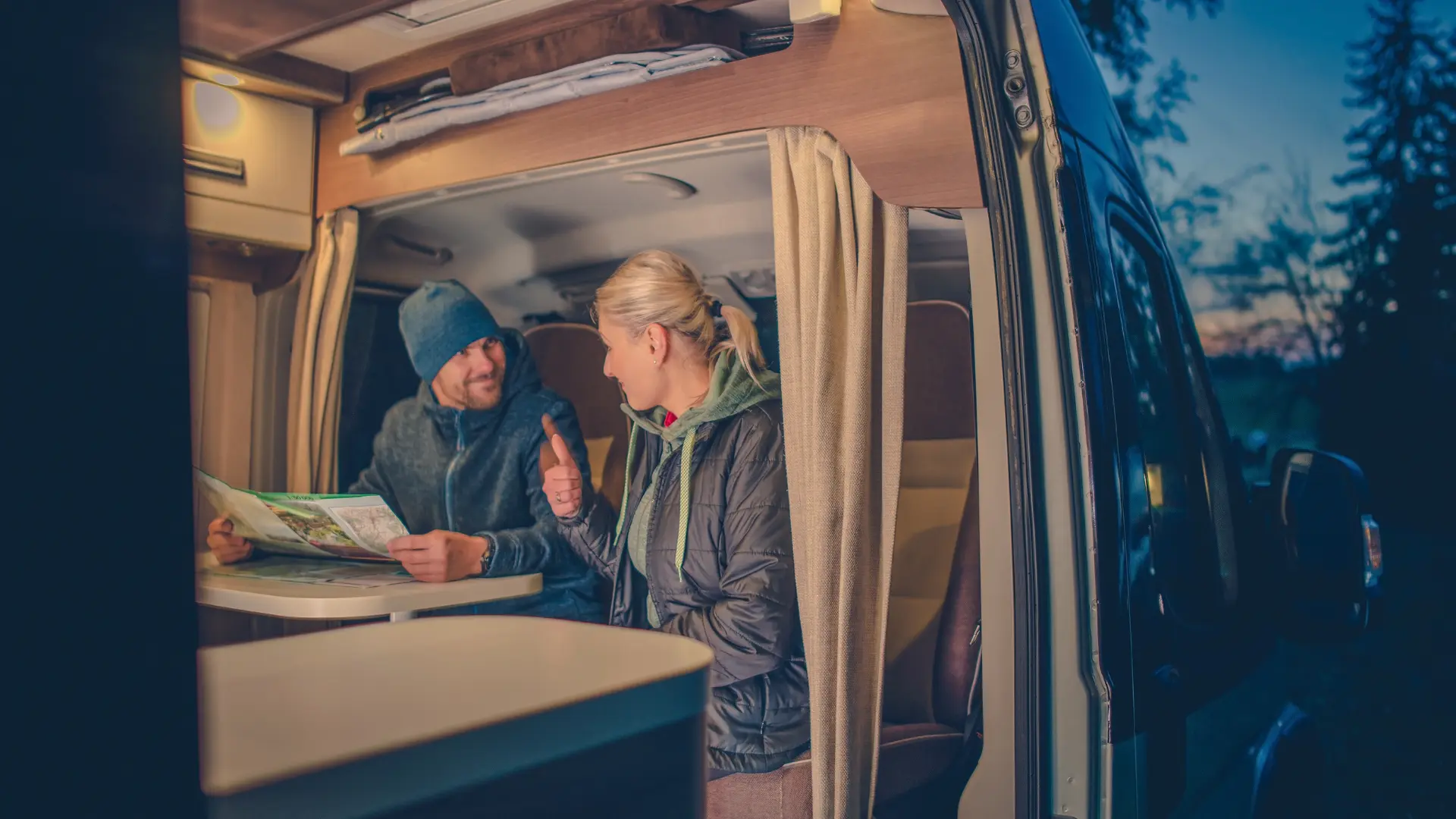Although camping with a young child may appear intimidating at first, you should give it a shot. It not only allows you to spend quality time with your child in nature but also has numerous benefits for the entire family. Spending time outdoors has been shown to reduce stress and improve overall well-being for both children and adults.
By introducing your baby to nature at a young age, you can instill a love of the outdoors, encourage sensory exploration, and create lasting memories as a family.
Camping is an excellent opportunity to reconnect with nature and one another. Taking your baby camping allows them to develop a sense of wonder and appreciation for the natural world.
In addition to making treasured family memories, you help your child develop resilience and adaptability as you explore the adventure of camping. Here are some tips for camping with a baby for first timers:
Tips and Tricks for Camping with a Baby checklist
1. Choosing the Right Campsite for Your Baby
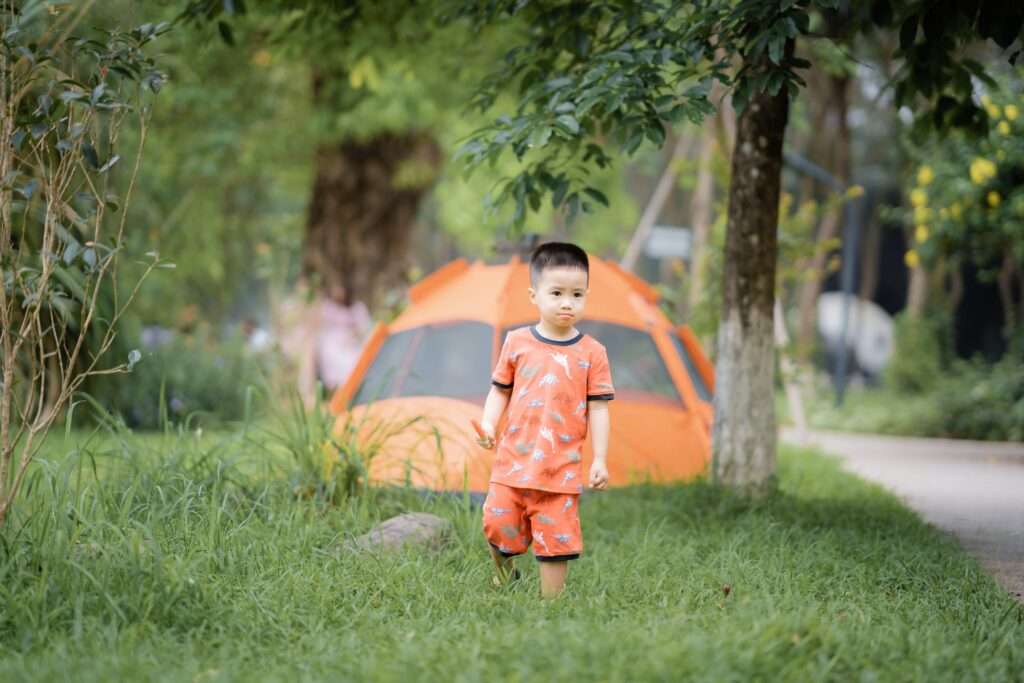
When selecting a campsite, it’s crucial to consider your baby’s needs. Look for a family-friendly campground that offers amenities such as clean restrooms, easily accessible water sources, and designated areas for families with young children.
Research the campsite’s proximity to medical facilities and ensure it has suitable facilities to cater to your baby’s needs. To make the camping experience more natural, you could look into a truck bed camping setup.
2. Camping with a Baby Checklist
Proper planning and packing are essential to ensuring a successful camping trip with a baby. Create a checklist that includes things to take camping with a baby, especially essentials such as diapers, wipes, extra clothing, and a first aid kit.
Don’t forget to pack child-safe sunscreen, insect repellent, and any special comfort items your baby may need, such as a favorite blanket or toy.
3. Baby-Friendly Sleeping Arrangements
Creating a safe and comfortable sleeping environment for your baby is crucial for a peaceful night’s rest. Consider investing in a portable crib or baby camping bassinet designed for camping, as these provide a secure sleeping space and allow your baby to remain close to you.
When you’re tent camping with a baby ensure that the sleeping area is free from hazards such as rocks, branches, or loose tent accessories. To add an extra layer of protection, consider investing in a quality kids’ sleeping bag that fits your child’s needs.
4. Clothing and Gear for All Weather Conditions
Nature is unpredictable, so it’s important to come prepared with appropriate clothing and gear when you’re camping with a baby. Dress your baby in layers, so you can easily adjust their clothing to suit the temperature.
Remember to pack extra hats, socks, and gloves to keep them warm. If you’re camping with a baby in hot weather, lightweight and breathable clothing is essential to ensure your baby stays cool and comfortable. It’s a good idea to bring a portable camping fan on the trip to keep your baby from fussing in the heat.
5. Baby Camping Must-Haves
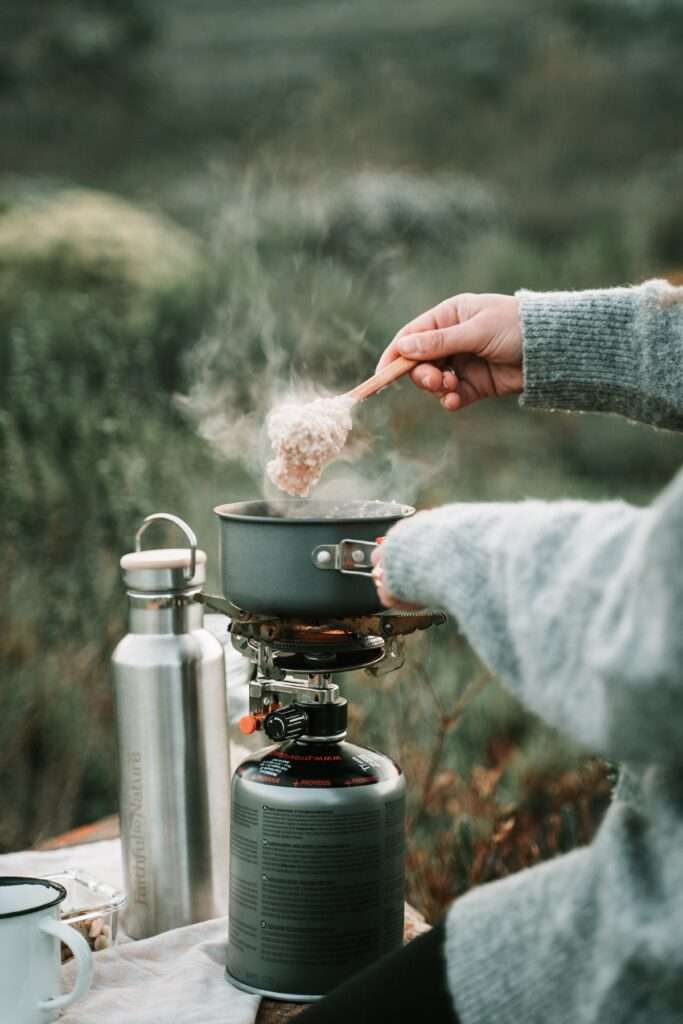
Feeding your baby while camping requires some additional planning. Pack a variety of nutritious snacks and easy-to-prepare meals, such as pureed fruits and vegetables, instant oatmeal, and finger foods.
Don’t forget to bring a portable baby camping chair or seat harness to make mealtime a lot easier. Additionally, consider packing a collapsible cooler to store perishable items and an insulated container for warm meals.
6. Babyproofing Your Campsite
Safety should be a top priority when camping with a baby. Take a proactive approach by babyproofing your campsite to minimize potential hazards.
Clear any debris or sharp objects from the immediate area and set up physical barriers to prevent your baby from wandering off unsupervised. Keep all camping equipment and items out of their reach to avoid accidents.
7. Safe and Comfortable Baby Zone
Creating a designated baby zone within your campsite will provide a safe and secure area for your little one to explore. Use soft mats or blankets to cushion the ground, ensuring a comfortable and clean space for them to play.
Place their toys and other age-appropriate items within arm’s reach, making it easy for them to engage in independent play.
8. Organizing the Campsite for Your Baby
Efficient organization is key to maximizing your baby’s comfort during your camping trip. Keep all of their essentials, such as diapers, wipes, and extra baby camping clothes, in easily accessible containers.
This will make getting things back faster and easier, so you can enjoy your time outside even more.
9. Baby-Friendly Sleeping Space
When setting up a sleeping space while camping with a baby, prioritize comfort and safety. Ensure the area is free from potential hazards such as rocks or uneven ground. Consider using a portable crib with a fitted sheet and a sleeping bag designed for babies.
By mimicking their sleeping environment at home, you can help your baby adjust to sleeping in a baby camping sleep sack more easily.
10. Creating Shade and Protection
Protecting your baby from the elements is vital to their safety and well-being. Set up a shaded area using a beach umbrella, canopy, or pop-up tent to shield them from direct sunlight.
Additionally, be mindful of wind conditions and use windbreaks or natural barriers to further protect your baby.
11. Engaging Your Baby with Nature
Introducing your baby to nature is an excellent way to spark curiosity and promote sensory development. As you do this it is also necessary to invest in proper baby camping gear. Take them on short walks around the campsite, pointing out different plants, animals, and natural features.
Encourage them to touch, smell, and explore their surroundings, fostering a sense of wonder and connection to the natural world.
12. Sensory Play
Nature provides a rich sensory experience for babies. Engage their senses by encouraging them to interact with various natural materials such as sand, leaves, and water.
Set up a nature-inspired sensory station with safe objects for them to touch, taste, and listen to, creating a multisensory environment that will stimulate their development.
13. Water Safety
Water activities can be a delightful and refreshing experience for your baby. However, it’s essential to prioritize water safety at all times. If your campsite offers a safe water source, such as a calm lake or shallow stream, introduce your baby to supervised water play.
Invest in a baby swimsuit with built-in flotation devices for added safety, and always keep a close eye on them near water.
14. Disposing Diapers
Diapering your baby in the great outdoors requires careful consideration of the best system to use. While disposables are convenient, environmentally-friendly cloth diapers can be a sustainable alternative when camping.
Unless there is a designated space to dispose of non-biodegradable waste, store the soiled diapers in an air-tight container.
15. Tips for Diapering in Nature
Maintaining cleanliness and hygiene while diapering outdoors is essential for your baby’s comfort and well-being. Choose an area away from the cooking and eating areas to change diapers.
Use disposable diaper bags or sealable containers to properly dispose of soiled diapers. Always wash your hands thoroughly with soap and water before and after diaper changes.
16. Washing and Bathing Your Baby in the Wild
Bathing your baby while camping may require creative solutions. Portable baby baths or collapsible buckets are practical options for bathing your baby using water from a nearby water source.
Opt for eco-friendly baby-friendly soaps and shampoos and be sure to dry your baby thoroughly to prevent rashes or irritations.
17. Breastfeeding Tips and Tricks
Breastfeeding while camping offers convenience and a special bonding experience for both you and your baby.
Ensure you have a comfortable spot to nurse, such as a cozy camping chair or a shaded area. If privacy is a concern, consider using a nursing cover or finding secluded spots in nature.
18. Preparing Baby Formula
If you choose to bottle-feed your baby while camping, it’s essential to prepare and handle formula safely. Be sure to bring enough pre-measured formula and sterilized bottles for the duration of your trip.
Use boiled or purified water for mixing the formula, and follow the manufacturer’s instructions carefully for proper preparation. Clean bottles thoroughly after each use to maintain hygiene.
19. Introducing Solid Foods while Camping
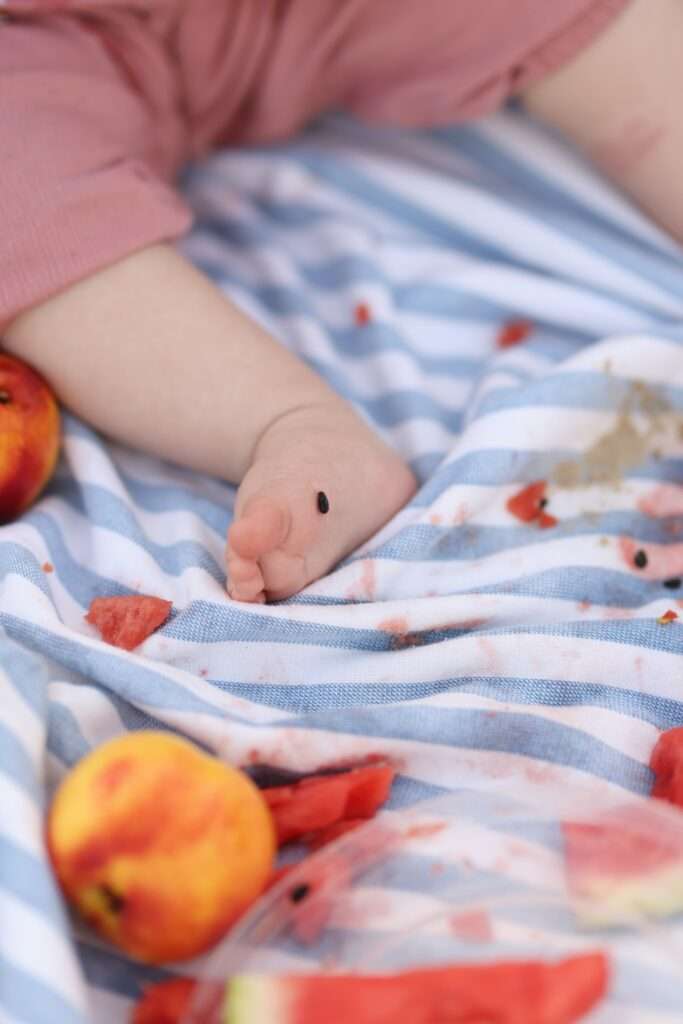
If your baby has started eating solid foods, camping provides an excellent opportunity to introduce them to new tastes and textures. Pack a variety of baby-friendly finger foods, such as sliced fruit, cooked vegetables, and easy-to-eat snacks.
Ensure good hygiene by washing your hands, using clean utensils, and properly storing any leftover food.
20. Helping Your Baby Adjust to Sleep in a Tent
Sleeping in a tent can be a new and exciting experience for your baby. Help them adjust by maintaining a consistent bedtime routine and familiar sleep associations. Bring along their favorite blanket or a stuffed animal to provide a sense of comfort and familiarity.
Consider using blackout shades or a portable crib with a built-in mesh cover to create a cozy sleep environment.
21. Naptime Strategies
Babies need plenty of rest, especially when exploring the outdoors. Create a peaceful environment for naptime by choosing shaded areas away from noise and distractions.
Use a comfortable and familiar sleep surface, such as a portable crib or bassinet, to encourage longer and more restful naps. Follow your baby’s cues and schedule naptimes accordingly, ensuring they get the rest they need.
22. Bedtime Routines and Soothing Techniques
Establishing a soothing bedtime routine is key to helping your baby wind down and sleep well while camping. Stick to familiar activities such as a warm bath, reading a book, or singing a lullaby.
Use gentle techniques like swaddling, rocking, or baby massage to help calm and relax your little one before bedtime.
23. Common Camping Hazards for Babies
Being aware of common camping hazards will help you take the necessary precautions to safeguard your baby. Keep an eye out for hazardous areas such as steep slopes, bodies of water, or fire pits.
Educate yourself about local poisonous plants or insects and take appropriate measures to protect your baby from potential risks.
24. First Aid Kit for Baby Camping
Having a well-stocked first aid kit is vital for any camping trip, especially when traveling with a baby. Include essentials such as band-aids, antiseptic wipes, thermometers, pain relievers, and any necessary prescription medications.
Familiarize yourself with basic first aid techniques for common ailments and know how to respond in case of emergencies.
25. Mosquitoes, Ticks, and Bugs Protection
Protecting your baby from mosquitoes, ticks, and other bugs is crucial for their safety and comfort. Use baby-safe insect repellents containing DEET or picaridin, and dress your baby in long sleeves, pants, and socks when venturing into bug-prone areas.
Consider using mosquito netting or a bug tent to create a protective barrier around your baby’s sleeping area.
26. Weather Woes
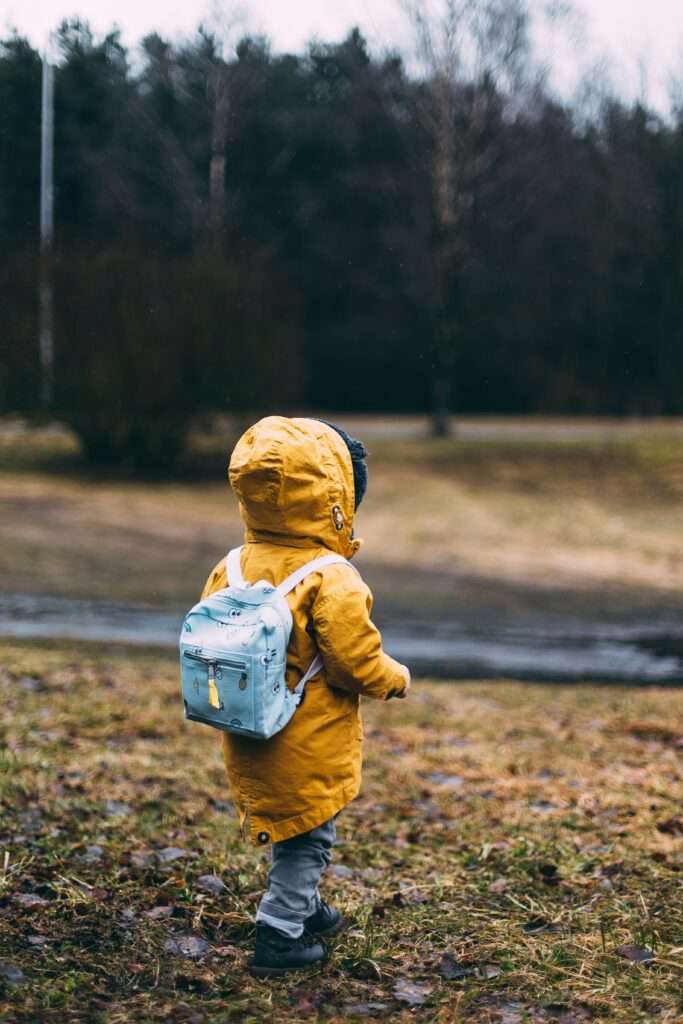
\While you can’t control the weather, you can be prepared for unexpected conditions. Dress your baby appropriately for the forecasted weather, but also pack extra layers and rain gear in case of sudden changes. Bring a large tarp or waterproof shelter to provide extra protection from rain or strong winds.
27. Dealing with Baby’s Changing Mood Swings
Babies have ever-changing needs and moods, even while camping. Be prepared to adapt your plans and activities accordingly. Allow for flexibility in your schedule and have a variety of age-appropriate toys and activities on hand to keep your baby engaged and stimulated. Respond to their emotional cues and provide comfort and reassurance as needed.
28. Coping with Limited Resources and Facilities
Camping often means limited access to resources and facilities. Utilize natural materials for diaper changes or improvise with items you have on hand. Emphasize the simplicity of nature and focus on the quality of time spent with your baby rather than the constraints of limited resources.
29. Tips for Photographing Your Baby
Documenting your camping adventures with your baby is a wonderful way to create lasting memories. Capture candid moments of laughter, exploration, and connection with nature. Utilize the natural lighting and scenery to create beautiful and unique photographs.
30. Incorporating Family Traditions
Camping offers a fantastic opportunity to establish and continue family traditions. Start new rituals such as storytelling around the campfire, stargazing, or cooking special meals together. Engage your baby in these traditions from an early age, creating a sense of belonging and fond memories that will last a lifetime.
31. Age Restrictions
Before planning a camping trip, it’s important to consider your baby’s age. Infants have different needs compared to older toddlers, and understanding these considerations will help ensure a safe and enjoyable experience for everyone.
Also, make note of factors such as temperature, sleep patterns, and your child’s developmental milestones when planning your camping adventure.
Conclusion
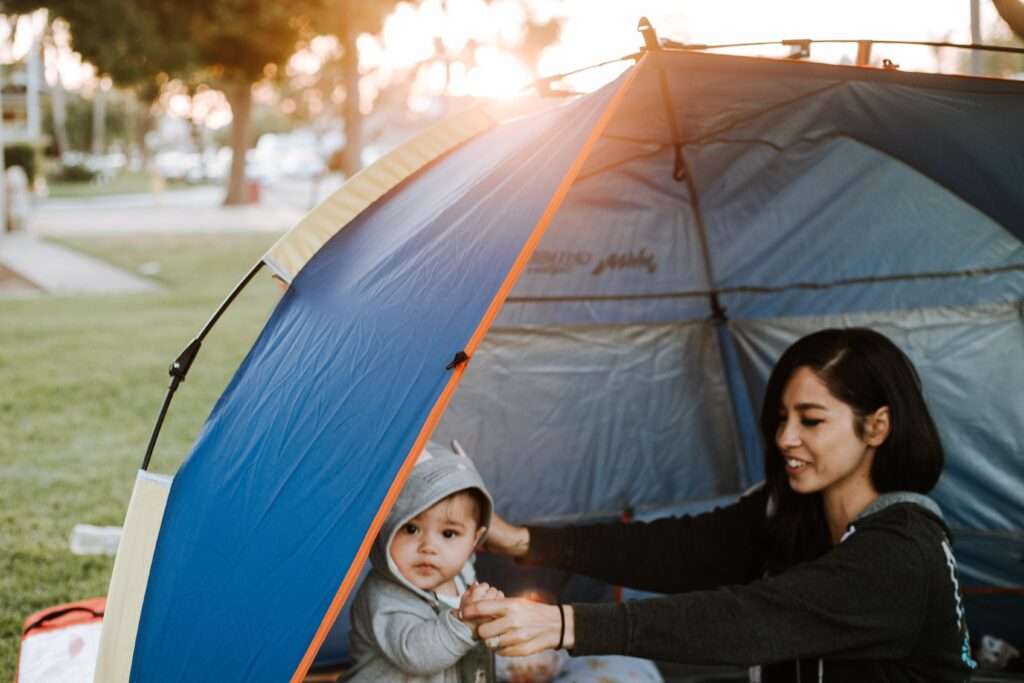
Camping with your baby is an adventure that brings joy and lasting memories. As you reflect on your camping experiences, cherish the moments of laughter, exploration, and the bond you’ve formed with your little one.
The memories you create while camping together will stay with your child, shaping their perspective and appreciation for the natural world throughout their lives. Go camping with your child, and let the fun begin!
